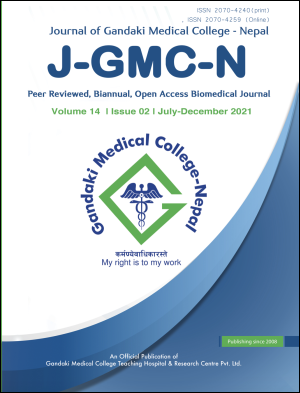A study on referral of patients in Department of Psychiatry at Lumbini Medical College and Teaching Hospital
DOI:
https://doi.org/10.3126/jgmcn.v14i2.36824Keywords:
psychiatric illnesses, referral psychiatry, tertiary care centreAbstract
Introduction: In a developing country like Nepal, where there is inadequate awareness but more social stigma towards psychiatric illnesses among people, there is an important role of referral psychiatry. Referral psychiatry has been considered to be an interface between psychiatric and non-psychiatric medicines as practiced in general hospital settings. This study analyses the psychiatric problems among patient referred to psychiatry department from other outpatient departments and emergency department in a tertiary care centre.
Methods: This was a descriptive hospital-based study conducted among patients who were referred to psychiatry department from different outpatient departments of Lumbini Medical College and Teaching Hospital from November 1, 2019 to April 30, 2020. Ethical issues were considered strictly. Data were entered into Statistical Package for the Social Sciences version 21.0 and descriptive analysis was done.
Results: A total of 781 patients were referred out of which more than half (n=487, 62.35%) were females and the most common age group was 41 to 50 years (n=175, 22.4%). Majority of patients (n=284, 36.4%) were referred from medicine department. The most common psychiatric illness diagnosed were those included under International Classification of Diseases 10th Revision F40-48 (Anxiety, Dissociative, Stress-related, Somatoform and other Non-Psychotic Mental Disorders).
Conclusions: Referral psychiatry plays an important role to diagnose the undiagnosed psychiatric illnesses earlier and better and manage accordingly so it should be prioritized and practiced in health centers.
Downloads
Downloads
Published
How to Cite
Issue
Section
License
Copyright (c) 2021 Ram Prasad Lamichhane, Bhaskar Sharma, Prakash Neupane, Nisha Bhattarai, Sandipa Sharma

This work is licensed under a Creative Commons Attribution-NonCommercial 4.0 International License.
This license allows reusers to distribute, remix, adapt, and build upon the material in any medium or format for noncommercial purposes only, and only so long as attribution is given to the creator.

